News
Vol.84 August
- Collaborated with the National Museum of Korea to Develop AI-powered Digital Platform Technology
- Adapting Cultural Heritage in Asian and European Museums to Spread Digital Standards
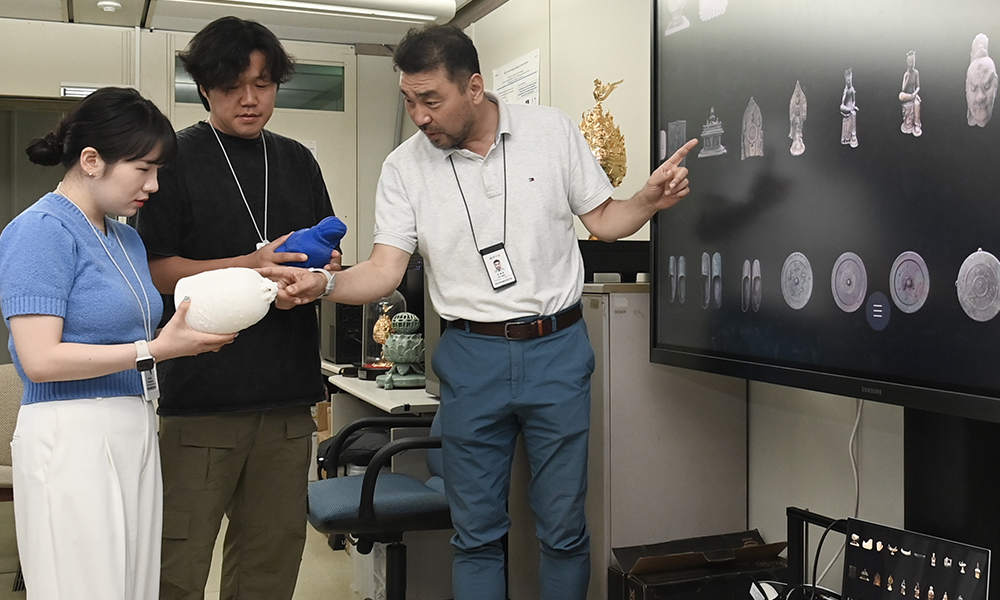
Korean researchers are advancing efforts to apply artificial intelligence (AI) to cultural heritage, with expectations that Korea’s digital ICT standard technologies will expand to cultural heritage sites across Asia and globally.
Electronics and Telecommunications Research Institute (ETRI) announced that it has been conducting digital standardization research and development since 2020 in collaboration with the National Museum of Korea, Korea National University of Cultural Heritage, Chung-Ang University, LiST Co., Ltd., and the Technology Research Institute for Culture & Heritage to secure technological sovereignty in the digital field of cultural heritage in the era of AI.
In particular, the National Museum of Korea is a world-class museum, ranked 6th in the world and 1st in Asia in terms of number of visitors as of 2023. ETRI’s technology development efforts for cultural resources in museums have been ongoing with the goal of coexistence and sustainability of culture and technology. ETRI’s technology development will be carried out in three phases, with the second phase of research currently underway.
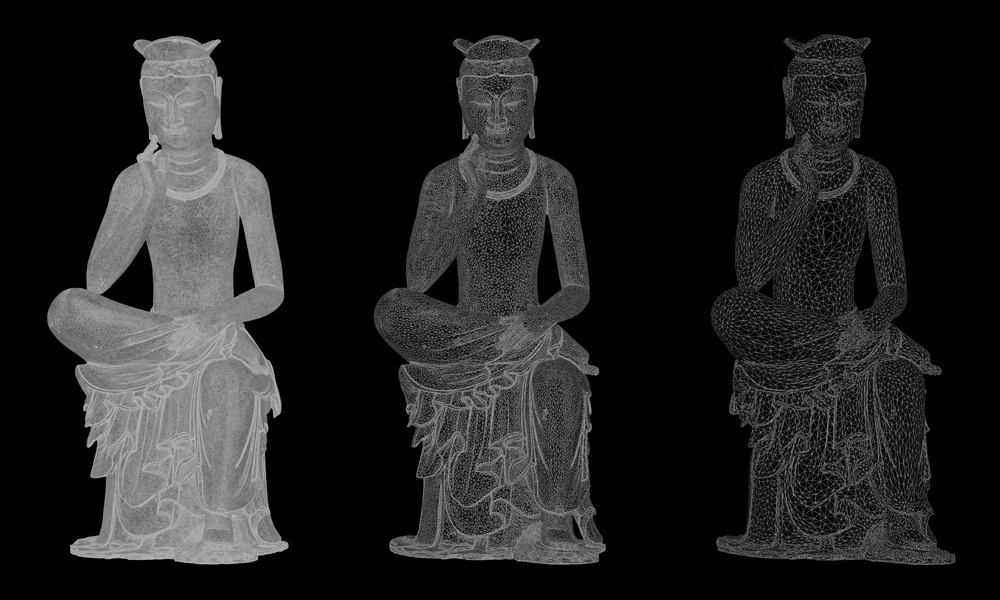 Pensive Bodhisattva digital asset data
Pensive Bodhisattva digital asset data
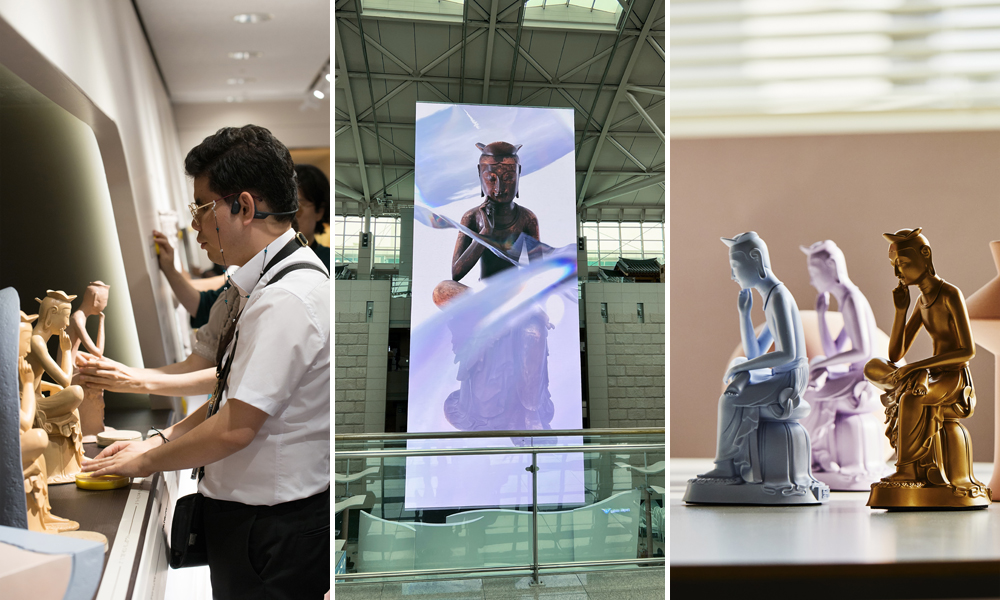 Digital Asset Data Use Cases
Digital Asset Data Use Cases
The first phase, which began in 2020 and lasted for three years, was the “Laying the Foundation for Intelligent Curation” phase, which developed a curation platform and operational technology to intelligently utilize the museum’s digital data. Based on high-quality Pensive Bodhisattva assets, various use cases have been created, including ▲ a “spatial five senses” exhibition for people with low vision, ▲ a media wall at Incheon International Airport (27 meters), and ▲ miniature Pensive Bodhisattva that led to the “MU:DS craze.”
Phase 2, which runs from 2023 to 2025, aims to “publish digital standards guidelines” and “develop an intelligent cultural heritage sharing platform.” A key achievement is the publication of the “Cultural Heritage Digital Asset Standard Guidelines 2024” with the National Museum of Korea and the Technology Research Institute for Culture & Heritage.
In addition, ETRI is participating in the work of “Standardization for Maintaining the Quality of Cultural Heritage Digital Data Creation” in cooperation with the Telecommunications Technology Association (TTA) of Korea, aiming to enact it within the year, and is contributing to the systematic management and increased utilization of high-quality digital data. The promotion of ISO international standards is expected to enhance the international usability and compatibility of museum digital cultural heritage and to strengthen the competitiveness of K-content and the digital industries.
The third and final phase, starting in 2026, is the “European diffusion and alignment with international standards” phase. ETRI plans to apply the previously developed technology to major European museums and cultural heritage to promote the dissemination of global digital standards.
Based on locally acquired European cultural heritage data, AR/VR content will be produced to create an environment where cultural heritage can be enjoyed without the constraints of time and space. It is also working on a proposal for the EU Horizon project, and if the project is adopted, it plans to ensure consistency with international standards such as the International Image Interoperability Framework (IIIF) and the Europeana Data Model (EDM) to enhance interoperability and shared usability.
ETRI is also currently developing key AI-powered technologies to enhance the utilization of digital cultural heritage. For example, it has established a multimodal content platform that integrates image, text, and 3D data for utilization, and developed technology to automatically generate metadata for AI training.
In addition, it has accumulated various research achievements such as ▲ cultural property database modeling ▲ automatic digital transformation technology for traditional cultural heritage ▲ standardization of ultra-high-resolution digital assets ▲ AI-powered quality improvement technology ▲ text mining-based knowledge relationship network generation ▲ visualization skill based on data fabric.
These R&D results can be utilized not only by museums but also by art galleries and libraries that produce digital assets, and currently, it is planning to transfer the technology to libraries.
ETRI and the National Museum of Korea will showcase the integrated platform and key achievements of their years of research and development for the first time to the public at the “2025 Museum and Art Gallery Expo”, held at the Kim Dae-jung Convention Center in Gwangju for four days starting September 4th.
Choi Seung Ae, Senior Curator of the Digital Museum Division, National Museum of Korea said, “The National Museum of Korea has steadily accumulated achievements in the convergence of technology fields with the goal of coexisting and sustaining culture and technology. We will continue to lead the way in data standardization in the midst of digital transformation and take a step forward toward the future of K-Museum.”
Lee Jae Ho, Principal Researcher of ETRI’s Content Convergence Research Section, said, “As a government-funded research institute, we are faithfully fulfilling our public role by leading technological standards in the field of cultural heritage digitalization and connecting them to global expansion. For the continued development of cultural and AI convergence technologies, strategic attention and support from the government and relevant authorities are required.”
This achievement was researched and developed as part of the Ministry of Culture, Sports and Tourism’s “Development of Intelligent Heritage Platform for Leading of Standardization on Digital Cultural Heritage” project.
Lee Jae Ho, Principal Researcher
Content Convergence Research Section
(+82-42-860-5428, jhlee3@etri.re.kr)
- Leading the Competition for International Standardization of Digital ID Wallets
- Securing Global Interoperability to Establish a Foothold in the International Market
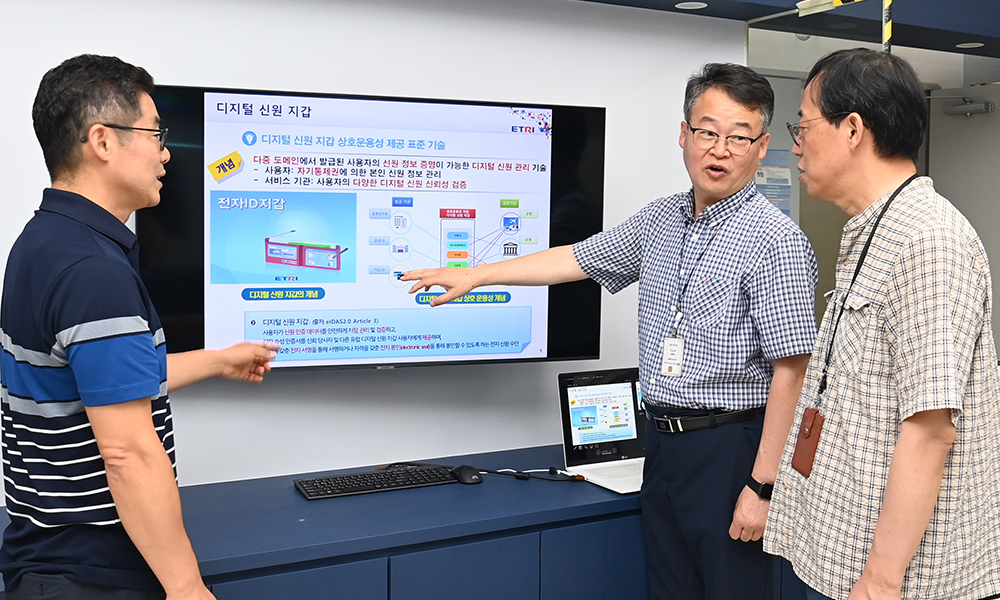
Electronics and Telecommunications Research Institute (ETRI) has officially begun developing an international standard for digital identity wallets to lead the way in the digital ID era. Digital identity wallets are the next generation of authentication technology that allows users to securely store and access a variety of identification documents on their smartphones, including resident registration cards, driver’s licenses, student ID cards, credit cards, and more.
Digital identity wallets, which began with mobile government IDs in Korea in 2021, are now expanding their use to mobile driver’s licenses, mobile resident registration cards, and more.
Through ongoing research in identity authentication technologies, ETRI researchers have developed ▲ user-centric identity management technologies and ▲ multi-factor authentication technologies, which form the foundation of digital identity wallets, and ETRI holds a number of core IPRs.
Specifically, user-centric identity management technologies are those designed to give users direct control and selective sharing of their identity information. Decentralized identifiers (DIDs)1) are applied to enhance privacy and reliability.
In addition, multi-factor authentication technology combines two or more authentication factors such as biometrics, smartphone security chips, and PINs to enhance security, and adopts FIDO22)-based authentication protocols to meet international security standards.
Through the development of this international standard, ETRI researchers will ▲ develop international standard patents to secure global interoperability3) of digital identity wallets ▲ develop technologies in cooperation with official standards developing organizations4) ▲ and expand empirical applications in the financial, public, and industrial sectors.
In particular, it is working with Financial Security Institute, which is well-versed in domestic security requirements, to enhance the effectiveness of digital identity authentication technology. In addition, it is promoting the spread of the technology in the European and domestic markets through joint research with Hopae Co., Ltd., which is active in the global open source platform OpenWallet Foundation.
Meanwhile, in Europe, the digital identity authentication law “eIDAS 2.0” came into effect in May 2024 and aims to have 80% of EU citizens using digital identity wallets by 2030.
Furthermore, it is strengthening its collaboration with the International Telecommunication Union (ITU), an international standardization organization, and the Linux Foundation’s OpenWallet Forum to expand global interoperability.
ETRI’s Cyber Security Research Division will use the research to make people’s digital lives more convenient and secure, and to spread the technology’s impact across the digital identity authentication industry.
Seung-Chan Bang, President of ETRI, said, “International standardization is more than just a technology competition, it’s a strategic activity at the national level. We will actively support research to ensure Korea achieves global leadership in digital identity authentication technology.”
This standardization project, led by ETRI, is part of the “Information and Communications Broadcasting Standard Development Support Project” of the Ministry of Science and ICT and the Institute of Information & Communications Technology Planning & Evaluation (IITP). ETRI is leading the project, with the Financial Security Institute and Hopae Co., Ltd. jointly participating.
1) Decentralized Identifiers (DIDs): An identification scheme designed to allow individuals or organizations to prove and manage their own identity without the intervention of a central authority. Unlike traditional centralized identity schemes (e.g: government-issued resident registration numbers, social media logins, etc.), DIDs operate on a distributed ledger, such as a blockchain, and users retain ownership and control of their identity information.
2) Fast Identity Online 2 (FIDO2): A global authentication standard that enables user authentication based on biometrics or security keys, designed to allow for secure login without the need for passwords, consisting of the Web Authentication (WebAuthn) API and the Client to Authenticator Protocol (CTAP) for communication between authenticating devices.
3) Interoperability: The ability for information to be exchanged seamlessly and functionality to be compatible across different systems or platforms.
4) Official standards developing organization: An organization that officially establishes and manages standards with the approval of a government or international organization, such as ISO, ITU, and ETSI.
Sang-Woo Lee, Principal Researcher
Cyber Security Research Division
(+82-42-860-1097, ttomlee@etri.re.kr)
- Principal Researcher Hyun Wook Appointed Chair of Advisory Group...Strengthening Leadership in International Standardization
- Dr. Kang Shin Gak Chairs First Meeting as SC 6 Chair, Demonstrating Leadership in International Standardization
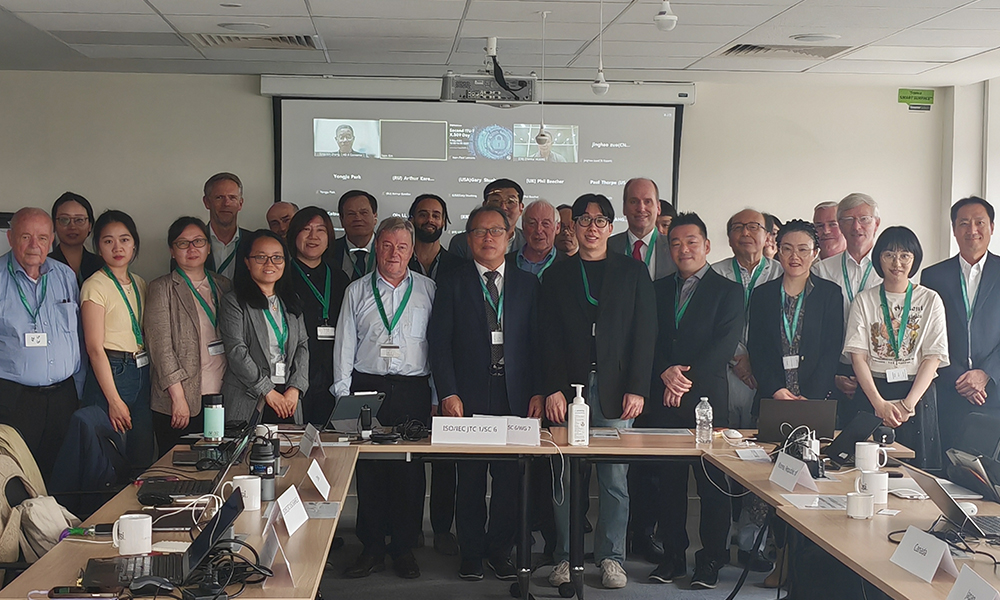
Electronics and Telecommunications Research Institute (ETRI) announced that the Metaverse Advisory Group1) was established at the ISO/IEC JTC 1/SC 62) meeting in London, Great Britain this June following a proposal of Korea. The group is responsible for overseeing international standardization in the field of Metaverse communications and is chaired by principal researcher Hyun Wook.
The Metaverse is still gaining attention as next generation Internet technology that bridges virtual and the real world. This achievement marks an important milestone demonstrating that Korea holds a leading position in the international standardization of emerging future technologies. It is expected to have a positive impact on the worldwide deployment of related technologies and securing industrial competitiveness.
Currently, various standardization organizations are actively working to establish standards for interoperability essential for Metaverse services. Both official standardization organizations, such as ISO, IEC, and ITU-T, are developing formal standards, while industry consortiums like the Metaverse Standards Forum (MSF) led by Khronos Group, OMA3 (Open Metaverse Alliance), and IEEE SA, are pursuing de facto standardization. Both groups are competing to establish new metaverse-related working groups to secure leadership and market influence.
Korea, which has consistently contributed to the international standardization of major ICT technologies, such as telecommunications, broadcasting, and satellite, has positioned itself as a leading player in the international standardization of Metaverse communications through its newly established Metaverse Advisory Group.
The group will serve as a control tower for Metaverse communication technology standardization in ISO/IEC JTC 1/SC 6, providing overall direction and strategy. Specifically, it is responsible for ▲ identifying new standardization tasks related to metaverse, ▲ setting technical standardization priorities, ▲ developing international standardization roadmaps, and ▲ establishing collaboration frameworks with other standardization organizations. Especially given the rapid pace of metaverse technology development, the group’s primary mission is to ensure that standardization efforts keep pace with technological innovation through proactive strategic planning.
The standardization initiatives set forth by this group provide Metaverse companies with a direction for technology development and help our companies stay ahead in the global marketplace. It also positions us well for future global licensing of related patents and technologies.
Hyun Wook, a principal researcher who was appointed as a Convenor3), has also been working as an Associate Rapporteur4) in charge of metaverse and multimedia frameworks in ITU-T SG21 Q9. Leveraging his expertise in the field, he plans to lead the development and implementation of an international metaverse standardization strategy.
This was also the first meeting chaired by ETRI’s principal researcher Dr. Kang Shin Gak, who was elected as SC 6 Chair5) at the November 2024 JTC 1 plenary meeting. Dr. Kang has been recognized for his outstanding leadership in international standardization, having served as Chairman of ▲ ITU-T Focus Group on metaverse (FG-MV)6), ▲ Joint Coordination Activities on Metaverse Standardization (JCA-MV)7), and ▲ WP4 of ITU-T SG 21.
In addition, a template for Preliminary Working Item (PWI) study report was officially adopted as a key achievement of ISO/IEC JTC 1/SC 6/AHG 4 (Ad Hoc Group for Best Practices), chaired by Korea. This template, which provides guidance and document structure, will significantly improve the quality and consistency of standardization process within SC 6.
ISO/IEC JTC 18) is a joint technical committee established by the International Organization for Standardization (ISO) and the International Electrotechnical Commission (IEC) that specializes in information technology (IT) standardization and has significant global industry impact. The committee consists of advisory groups, ad hoc groups, coordination groups, working groups, and 23 subcommittees (SCs).
Among the subcommittees, SC 6 (Telecommunications and information exchange between systems) develops international standards for inter-system communication and information exchange. It covers diverse areas including near field communication (NFC), future networks, unmanned aerial vehicle communication, directory services, etc. ETRI’s Principal Researcher Dr. Kang Shin Gak currently serves as Chair of this subcommittee.
In addition to the new Advisory Group, ETRI has played a leading role in the ITU-T Focus Group on metaverse (FG-MV) as its chair since 2022. Under ETRI’s leadership, FG-MV developed 52 pre-standardization deliverables. ETRI plans to continue this leadership role as a chair of the newly established ITU-T Joint Coordination Activity on Metaverse Standardization (JCA-MV) starting in 2025.
Lee Seung Yun, Assistant Vice President of Standards Research Division at ETRI, stated, “As metaverse technologies expands beyond entertainment to encompass various industries, the leading of SC 6 meeting and the establishment of the Advisory Group have created a systematic foundation for Korea to lead international standardization efforts. We will actively support securing future market leadership in emerging industries through research-based standardization.”
The Metaverse, which entered the market prematurely during the pandemic, is currently facing challenges, but global companies such as Nvidia, Google, Apple, and Meta continue investing heavily in core technology. This reflects the typical pattern of emerging markets, where market eventually separates winners from losers, with survivors establishing market leadership.
The metaverse industry is expected to grow at a CAGR of 46.4% from $105.4 billion in 2024 to reach $936.6 billion by 2030, according to a new report from global market research firm Grand View Research. Advances in VR and AR technology, the proliferation of digital asset trading, and the expansion of applications to industries such as gaming, education, and entertainment, as well as manufacturing, are key growth drivers.
Furthermore, the metaverse, enhanced by generative AI and enriched with diverse content, will become increasingly intelligent and autonomous, emerging as a core platform for the future Internet and a critical pillar of national and corporate competitiveness.
ETRI will continue to proactively secure international standards through ISO/IEC JTC 1 and ITU-T in core technology areas including metaverse platform interworking and virtual convergence service interoperability, while working to strengthen global competitiveness in related industries.
This work was supported by Institute of Information & communications Technology Planning & Evaluation (IITP) grant funded by the Korea government (MSIT).
1) Metaverse Advisory Group (AG-Metaverse): An advisory group to discusses standardization strategies and methods for promoting metaverse technology and identifies future issues.
2) JTC 1/SC 6: A group responsible for international standardization of telecommunications and intersystem information exchanges, promoting standardization of NFC (near field communication), future networks, unmanned aerial vehicle communication protocols, directory systems, etc. Principal researcher Kang Shin Gak of Korea has been serving as the international chair since this year.
3) Convenor: A group leader who runs the operations and meetings of a working group (WG) that creates an International Standard and is responsible for overseeing and managing the projects assigned to the WG.
4) Rapporteur: an ITU-T expert responsible for studying specific Questions and developing Recommendations. They provide technical advice, moderate discussions, and coordinate with related groups while requiring organizational support.
5) SC 6 Chair: The Chair of the technical subcommittee SC 6 of ISO/IEC JTC 1.
6) Focus Groups on metaverse (FG-MV): A special group for pre-standardization work in the metaverse, open to experts from around the world who are not ITU members. From December 2022 to June 2024, Kang Shin Gak, a principal researcher at Electronics and Telecommunications Research Institute, Korea, served as the chair and developed a total of 52 metaverse pre-standardization documents and concluded the activities.
7) Joint Coordination Activity on Metaverse Standardization (JCA-MV): A group that coordinates ITU-T’s metaverse standardization activities and conducts global standardization cooperation activities with external standards groups. At the ITU-T Telecommunications Standards Advisory Group (TSAG) meeting held in May 2025, JCA-MV was newly established chaired by Dr. Kang Shin Gak.
8) ISO/IEC JTC 1: A technical committee formed by the international standards organizations ISO and IEC to promote information technology standardization, with a significant standardization influence on industry.
Dr. Kang Shin Gak, Principal Researcher
Intelligence & Information Standards Research Section
(+82-42-860-6117, sgkang@etri.re.kr)